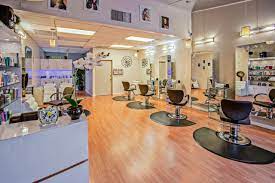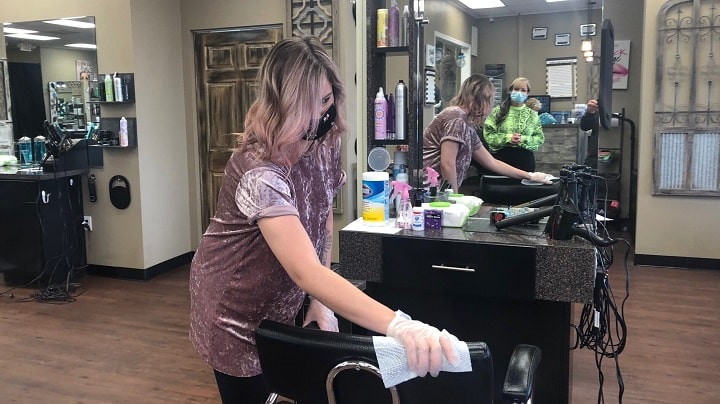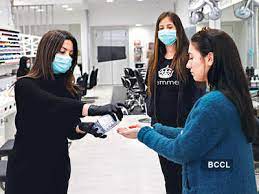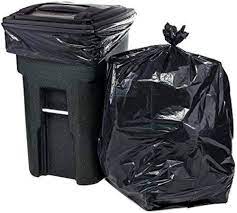Beautician Class 52 Hygine
Before REG Beautician Class Note 1
Good Hygiene Practice for Makeup Artists

1) Thoroughly disinfect your workspace before each client and after each client.
2) Only book one client at a time and do not work on more than one person at one time – keep all clients separate from each other.
3) Wear a face covering to protect yourself and your clients
Additional CDC guidelines on how to properly wear face coverings (consider offering PPE face coverings to your clients upon booking):
4) Wash your hands consistently for at least 20 seconds, before, during, and after application – take the time for this, be sure to show your client that you are professional, clean, and sanitary and take these new guidelines with the utmost care and consideration.
Important: Make sure to reschedule if you or your client have any symptoms – specifically a fever or other flu-like symptoms (be flexible on your cancellation right now, as it is most important to keep you and your clients safe).
Do not work with any client who has a temperature and/or has any symptoms of being sick – never use your makeup products on anyone who is not feeling well. Make sure you allow at least 2 weeks before rebooking if a client or yourself is ill.
5) Sanitizing your products, workspace, makeup are all the same – make sure you only use disposable tools and everything is properly cleaned and sanitized.
Additional FDA information on the importance of hand sanitizing as well as the Food and Drug Administration’s COVID 19 health and safety precautions:
Additional Center for Disease Control tips on sanitizing and disinfecting that also apply to your workspace:
Cleanliness is KEY!
Hygiene & Sanitation Practices (memorize, study, and bookmark – this is the key to your work as a professional artist to ensure the safety and wellbeing of your clients):
As a professional Makeup Artist, you will be working with many different clients. It is of utmost importance for you to practice sanitary techniques with each individual client. Whether it is before makeup application (preparing your makeup kit), during makeup application (not mixing certain products, using disposable tools, and being mindful of the skin preparation and application), or after (cleaning your brushes and kit for the next client), it is crucial that you follow these steps each and every time you are working. There are no shortcuts to remain sanitary and apply proper hygienic care to each client and the products you use on them to create your artistry. Hygienic care and sanitation will serve as one of the biggest building blocks in your business to create growing clientele and lifelong loyal clients!
Sanitation is the most crucial element of a professional Makeup Artist.
- You are working with the client’s skin, mucous membranes, and body – you must always keep this in mind and follow these sanitation protocols for yourself and client.
- Always keep your client in mind, first and foremost.

Products you must have in your kit to remain sanitary:
- Paper towels + tissues
- Disposable tools (sponges, eyeshadow applicators, lip brushes, mascara wands, cotton rounds, q-tips).
- Metal plate + spatula (you will always use this to apply cream product, you will never double dip).
- Powder products, use a clean paper towel + alcohol spray to remove top surface layer.
- Always close your product after use.
- Professional brush cleaner (this is used for quick on set cleaning, you must always do a deep clean on your brushes after use).
- Alcohol (70%) – saturate and let sit for 30 seconds and wipe off.
- Trash bag (to keep your station clean and sanitary).
- Ziploc bags to put dirty brushes in (if there is not enough time to clean on set) – this is a good way to keep your dirty brushes separate from your other items in the kit.
Additional steps to remain sanitary :–

In addition to keeping your inside sanitary products, always keep the outside of your products clean.
Be mindful of expiration dates on your products – look at the back of the product and look for the shelf life. Make notations on your product of when you opened so you know when the product will expire.
Never keep expired products in your professional makeup kit.
Always be mindful and aware of your client’s allergies – most importantly pay attention to ingredients of products if your client does have sensitivity or allergies.
Never use products straight from the tube (a wand, squeeze, or tube) – put on a palette and work from there, for mascara and lip use disposables (but never double dip). One and done.
For lotions, primers, etc. – Always put on a metal palette and not directly on your hands.
It is preferred to use tools rather than fingers (this will keep your client as well as yourself sanitary).
If you use your fingers, you must always sanitize your hands.
somewhere for granted, is in the news again. We have never been more conscious about hand washing, face touching or hand shaking than now.
It seems to be an appropriate time to revisit some points on sanitation and hygiene for professional makeup artists and other beauty professionals. Every beauty professional should be following these guidelines at all times, and not just when there is a global epidemic like this.
Courses for makeup artists are taught about proper sanitation and hygiene as part of their curriculum. However, not all makeup courses are officially accredited by an educational awarding body, so they may or may not cover these areas. Also, there are many self makeup artist, and they may not be aware of key hygiene practices Sadly, but the makeup artist can harm your health if they are not adhering to the proper hygiene practices. There are many cases of unhygienic practices being followed in the makeup industry like using dirty brushes, gloss / mascara being applied straight from the wand, directly applying
bullet lipsticks on the lips and even the recycling of false lashes. It’s very unethical and unprofessional to ignore hygiene and passing on of germs and viruses from one person to another. Nobody likes to catch a cold sore or conjunctivitis, and possibly catching a nasty virus like Coronavirus is definitely not cool. Makeup hygiene is the best way to keep unpleasant skin infections away. If you don’t practice makeup hygiene, then no amount of cleansing, toning and moisturizing will help keep your skin clear. It is not worth being at risk for any number of infections. A qualified and experienced best makeup artist will always be trained properly and will know the importance of keeping a clean and hygienic kit. Key hygiene practices that a Makeup Artist must follow:

- Always wash or sanitize your hand prior to touching your client’s face. We all have natural oils in the palms of our hands that attract dust and germs that are easily transferred to the face and to makeup products & tools. For ease of use, keep a sanitizer in your makeup kit!
- Try using disposable applicators to apply lip gloss and mascara. This ensures there’s no cross contamination or product mixing since they have to be dipped only once and then thrown away. NO double dipping!
Once or twice a week, clean / shampoo your makeup brushes. Cleaning your makeup brushes is one of the most tedious tasks ever but also one of the most important things among hygiene tips. Brushes that are dipped in liquid and cream products attract bacteria and should be cleaned every few days.
3.Clean or Sanitize the brush between clients, or always use a clean brush on your next client. This point is absolutely crucial! Using dirty brushes on clients is an absolute NO-NO. Use a brush sanitizer / cleanser to quickly clean your brushes between use or keep spare brushes with you when you know you have multiple clients to be done.
4.Wash your makeup sponges after every use and replace them at regular intervals. Since sponges are wet and are used to blend liquid or cream products, much like your brushes they also attract dust and bacteria. 6. Toss out your makeup (check for the expiry date) at regular intervals. All makeup and skincare products have expiry dates. Mascaras expire in 6 months, Eyeliner in 12 months, Pressed powder (eyeshadow, blush, contour, highlighter etc.) in 2-3 years and Foundation in 12 months.
- Use mixing palettes and spatulas to decant wax, cream and liquid products. Stainless steel palette and spatulas are available in the market for this purpose. These are used to take product out on and to mix colors since dipping your brushes or sponges again & again directly into these products is not hygienic.
- Always sharpen eye and lip pencil between each use. Do this using a clean sharpener. It removes the part that has the bacteria. Also, sanitize the sharpener using rubbing alcohol once a week.
- Use a fresh pair of false lashes on every new client, avoid recycling it. If recycling, remember to sanitize it properly. Lashes can be sanitized by peeling off the glue first and then taking a cotton pad and pouring some makeup remover and cleaning the residue
- Clean the makeup kit on a regular basis and sanitize the palettes. This is supremely important because it ensures general hygiene of the kit. To sanitize your pressed powder palettes, also spray some rubbing alcohol from a distance on them and then clean the sides with a tissue paper.
- Do not leave your makeup container open for long. This will prevent any dust particles from settling into the products and will also prevent your gel products from drying out too quickly.
- Try keeping your nails short and clean because longer fingernails can possess more dirt & bacteria as compared to short fingernails, basically increasing the risk of spreading infection.
- Be weary of body odor and smell pleasant when going for an assignment by appropriate use of deodorants. This is a part of basic hygiene since we live in such warm climatic conditions where one tends to sweat often we must ensure that we smell good at all times.
- Keep a mint with you to avoid bad breath. Do not chew gum while working. Just as your body should smell pleasant, your breath should also smell good because you will be working in close proximity with the client.
In the middle of the Coronavirus outbreak, if you have already made an appointment and you suspect that you may be ill, then please cancel your appointment. It is not worth it in any scenario to spread a highly infectious disease. We all need to be considerate and sensible during this time.